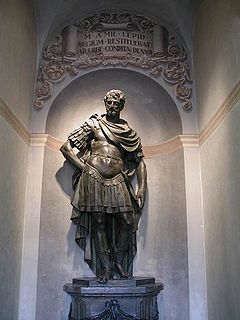Related Research Articles

The 2nd century BC started the first day of 200 BC and ended the last day of 101 BC. It is considered part of the Classical era, although depending on the region being studied, other terms may be more suitable. It is also considered to be the end of the Axial Age. In the context of the Eastern Mediterranean, it is referred to as the Hellenistic period.
Year 256 BC was a year of the pre-Julian Roman calendar. At the time it was known as the Year of the Consulship of Longus and Caedicius/Regulus. The denomination 256 BC for this year has been used since the early medieval period, when the Anno Domini calendar era became the prevalent method in Europe for naming years.
Year 241 BC was a year of the pre-Julian Roman calendar. At the time it was known as the Year of the Consulship of Atticus and Cerco. The denomination 241 BC for this year has been used since the early medieval period, when the Anno Domini calendar era became the prevalent method in Europe for naming years.
This article concerns the 200 BC decade, that lasted from 209 BC to 200 BC'.
This article concerns the period 149 BC – 140 BC.
This article concerns the period 159 BC – 150 BC.
This article concerns the period 259 BC – 250 BC.
This article concerns the period 179 BC – 170 BC.
This article concerns the period 189 BC – 180 BC.
This article concerns the period 199 BC – 190 BC.
Year 206 BC was a year of the pre-Julian Roman calendar. At the time it was known as the Year of the Consulship of Philo and Metellus. The denomination 206 BC for this year has been used since the early medieval period, when the Anno Domini calendar era became the prevalent method in Europe for naming years.
Year 197 BC was a year of the pre-Julian Roman calendar. At the time it was known as the Year of the Consulship of Cethegus and Rufus. The denomination 197 BC for this year has been used since the early medieval period, when the Anno Domini calendar era became the prevalent method in Europe for naming years.
Year 193 BC was a year of the pre-Julian Roman calendar. At the time it was known as the Year of the Consulship of Merula and Thermus. The denomination 193 BC for this year has been used since the early medieval period, when the Anno Domini calendar era became the prevalent method in Europe for naming a year.
Year 190 BC was a year of the pre-Julian Roman calendar. At the time it was known as the Year of the Consulship of Asiaticus and Laelius. The denomination 190 BC for this year has been used since the early medieval period, when the Anno Domini calendar era became the prevalent method in Europe for naming years.
Year 188 BC was a year of the pre-Julian Roman calendar. At the time it was known as the Year of the Consulship of Messalla and Salinator. The denomination 188 BC for this year has been used since the early medieval period, when the Anno Domini calendar era became the prevalent method in Europe for naming years.
Year 178 BC was a year of the pre-Julian Roman calendar. At the time it was known as the Year of the Consulship of Brutus and Vulso. The denomination 178 BC for this year has been used since the early medieval period, when the Anno Domini calendar era became the prevalent method in Europe for naming years.
Year 263 BC was a year of the pre-Julian Roman calendar. At the time it was known as the Year of the Consulship of Mesella and Crassus. The denomination 263 BC for this year has been used since the early medieval period, when the Anno Domini calendar era became the prevalent method in Europe for naming years.

Marcus Aemilius Lepidus was a Roman consul, Pontifex Maximus, Censor and Princeps Senatus. A scion of the ancient Patrician gens Aemilia, he was most likely the son of Marcus Aemilius Lepidus, with his brothers being Lucius and Quintus.

The Galatian War was a war between the Galatian Gauls and the Roman Republic supported by their allies Pergamum in 189 BC. The war was fought in Galatia in central Asia Minor, in present-day Turkey.

The 0s cover the first nine years of the Anno Domini era, which began on January 1, 1 AD and ended on December 31st, 9 AD. It is one of the two "0-to-9" decade-like timespans that contain 9 years, and are not decades.